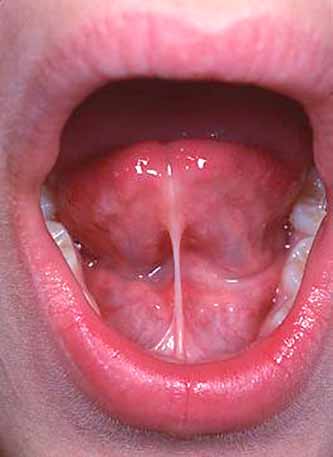Ankyloglossia (Tongue-tie)

Ankyloglossia is commonly known as tongue-tie.
Understanding Ankyloglossia:Ankyloglossia refers to a condition where the lingual frenulum, the thin band of tissue that connects the underside of the tongue to the floor of the mouth, is shorter or tighter than usual. This restricted movement of the tongue can cause various difficulties and affect oral function.
Signs and Symptoms:
The signs and symptoms of ankyloglossia can vary depending on its severity. Some common signs to look out for include:
1. Difficulty Breastfeeding: Infants with ankyloglossia may have trouble latching onto the breast and maintaining a proper sucking motion. This can lead to poor breastfeeding outcomes, inadequate milk transfer, and slower weight gain.
2. Speech Challenges: Older children and adults with ankyloglossia may experience difficulties with speech clarity and pronunciation. They may struggle with certain sounds, such as "t," "d," "th," and "l," and their speech may sound "clipped" or "slurred."
3. Oral Hygiene Issues: The restricted movement of the tongue can make it challenging to effectively clean the surfaces of the teeth and gums, leading to an increased risk of dental problems such as tooth decay and gum disease.
Treatment Options:
Dr. Seejo George offers comprehensive treatment options for ankyloglossia, considering each patient's individual needs and goals. Treatment options may include:
1. Frenotomy: A frenotomy, also known as a tongue-tie release, is a simple and safe procedure where the frenulum is cut or released. This procedure is often performed using a laser or scalpel, and it helps improve the range of motion and function of the tongue.
2. Frenuloplasty: In some cases, where the ankyloglossia is more severe or requires additional correction, a frenuloplasty may be recommended. This procedure involves reshaping and lengthening the frenulum to allow for better tongue mobility.
3. Speech Therapy: Following the release procedure, speech therapy may be recommended to improve speech articulation and address any lingering speech challenges.
Compassionate Care for You or Your Child:
Dr. Seejo George understands the impact that ankyloglossia can have on a person's overall well-being and quality of life. He takes a compassionate and personalized approach to each case, ensuring that patients and their families feel comfortable and supported throughout the treatment process.
If you or your child is experiencing difficulties related to ankyloglossia, we encourage you to schedule a consultation with Dr. Seejo George. He will conduct a thorough evaluation, discuss treatment options, and create a customized plan to help you or your child find relief and achieve optimal oral function.
Contact us today to schedule a consultation and take the first step towards providing yourself or your child with the best possible care for ankyloglossia.






